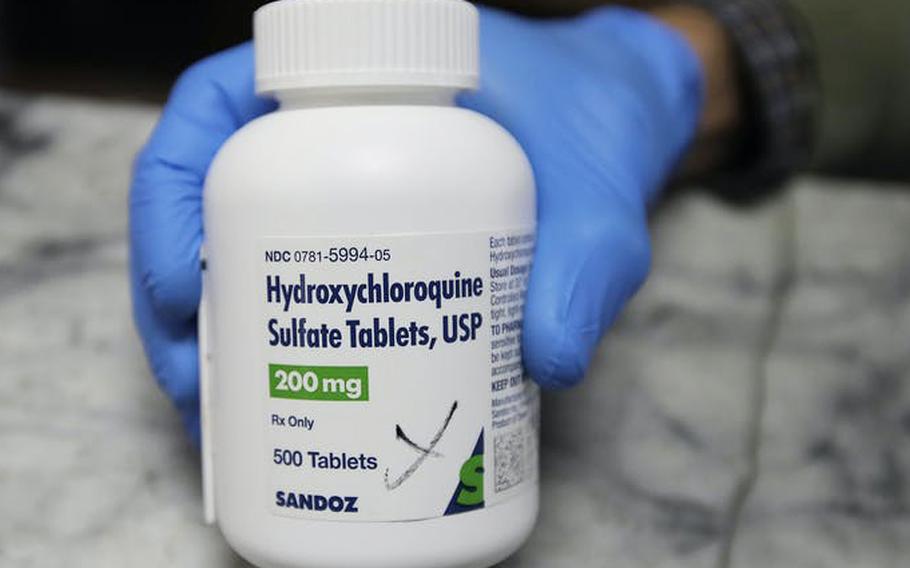
A pharmacist shows a bottle of the drug hydroxychloroquine. (Ben Margot, Star Tribune/TNS)
Stars and Stripes is making stories on the coronavirus pandemic available free of charge. See other free reports here. Sign up for our daily coronavirus newsletter here. Please support our journalism with a subscription.
WASHINGTON – Department of Veterans Affairs officials said March 26 that it was “irresponsible” to suggest the malaria drug hydroxychloroquine had any merit as a coronavirus treatment. The same day, the VA placed an emergency order for it.
President Donald Trump held up hydroxychloroquine as a “game-changer” – a miracle cure for the virus that has killed thousands of Americans, infected more than 400,000 and changed everyday life. Experts aren’t so sure about the drug, which is used for rheumatoid arthritis and lupus but is an unproven treatment for the coronavirus.
Dr. Anthony Fauci, the top infectious disease doctor in the United States, said on Fox News last week it would be a “majestic leap” to consider it a knockout drug for the virus. Some studies have suggested the drug was promising, especially for mild cases, but the studies were small and didn’t include control groups. One of the studies has since been discredited.
“We still need to do the kinds of studies that definitively prove whether any intervention, not just this one ... is truly safe and effective,” Fauci said.
Trump began touting the drug during White House briefings in mid-March. Around the same time, the VA Inspector General’s Office, tasked with determining how prepared the department was for the pandemic, questioned leaders of VA medical facilities about their supplies of hydroxychloroquine. Eight of the 58 hospitals that were surveyed reported needing more of the drug.
Leaders of the Veterans Health Administration disapproved of the question.
“We object to [the Office of Inspector General]’s assertions that a 14-day supply of chloroquine or hydroxychloroquine would have any merit,” management wrote in response. “This is both inaccurate and irresponsible. There are active investigations into these drugs and many others, as discussed by Dr. Anthony Fauci. Yet no conclusions have been made on their effectiveness.”
Further, they wrote the IG’s suggestion to supply the drug displayed a “dangerous lack of expertise on Covid-19 and pandemic response.”
The response was dated March 26. That same day, the department signed a $40,000 contract with McKesson Corp. for hydroxychloroquine sulfate. In the description of the contract, the VA wrote, “Covid-19 Emergency.”
The VA purchased $208,000 worth of hydroxychloroquine in a six-day period, federal contracting records show. The second contract, worth $168,000, was signed April 1 with Golden State Medical Supply Inc. Like the first, “Covid-19 Emergency” was listed in its description.
However, the VA said Thursday that most of the supply would be used to treat non-coronavirus conditions, such as lupus and rheumatoid arthritis.
“The bulk of this order will be used for those purposes,” said VA Press Secretary Christina Noel. “VA is only using hydroxychloroquine to treat Covid-19 in cases where veteran patients and their providers determine it is medically necessary.”
Noel said the use would fall in line with guidance from the Food and Drug Administration. Late last month, the FDA granted emergency approval, allowing doctors to use hydroxychloroquine to treat hospitalized coronavirus patients in certain instances. The potential benefits of using the drug must outweigh the risks, and there must be no adequate, approved or available alternative, the guidance says.
Hydroxychloroquine can have side effects, such as diarrhea, nausea, skin rash and stomach pain, and it’s not safe for people who have heart abnormalities, certain eye diseases or liver or kidney disease.
The presidents of the American Heart Association, American College of Cardiology and the Heart Rhythm Society published a paper Wednesday, warning the drug can cause disruptions in heart rhythm.
Wentling.nikki@stripes.com Twitter: @nikkiwentling